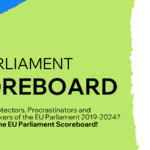Developed countries meeting at the UK-hosted Climate and Development Ministerial meeting on March 31st should announce to prepare new pledges for rising climate finance levels for the period 2021-2025, to exceed the $100bn floor.
“Financial support speaks louder than words and European governments must at least double their previous cycle of commitments – and some smaller contributors need to go far beyond doubling. Contributions should represent a net increase in finance on top of development and aid budgets to help developing countries achieve green and fair recoveries, adapt to climate impacts and transition away from fossil fuels”, said CAN Europe’s Climate and Development Policy Coordinator, Rachel Simon.
Before COP26, European governments and the EU should commit to allocate by 2025 at least 50% of their climate finance for developing countries to adaptation -through bilateral commitments, the EU budget, the European Investment Bank (EIB) and European development finance institutions. This is crucial to reduce climate risks for marginalised, vulnerable populations in developing countries – in line with UNSG Antonio Guterres’s call at the Climate Adaptation Summit in January 2021.
According to a recent report by ACT Alliance, a Climate Action Network Europe’s member, less than one-third of climate finance reported by EU institutions went towards adaptation in 2018, and the growth in climate finance has started to slow down – a concerning trend.
In the next EU budget, the 2021-27 Multiannual Financial Framework, climate finance for developing countries will be delivered through the new Global Europe Instrument which has a 30% climate action target. Without a dedicated adaptation target, the EU must ensure sufficient attention to adaptation in deciding spending priorities with partner countries, and finance for adaptation should increase in the new budget period. The EIB will also be further developing its new climate bank roadmap this year, which must set out how it will support developing countries by delivering on adaptation, improve its gender responsiveness and support small actors, MSMEs, and local level climate action.
“The UK ministerial has to send a strong message that the least developed countries and vulnerable communities, who have contributed least to climate change, need to receive greater attention. It is certainly worrying that EU institutions’ share of allocated climate finance going to least developed countries in 2018 fell, while the share going to upper middle-income countries increased,” said CAN Europe’s International Climate Policy Coordinator, Sven Harmeling.
The event’s Chair Summary must include an explicit commitment, by both contributors and recipients, that programs are implemented in a socially just and locally-led way, including through strengthening gender equality and women’s leadership, inclusiveness, and truly participatory approaches because climate and social justice go hand in hand.
The Ministerial is an opportunity to suggest what the guiding path for the next months look like with upcoming pledging moments such as the Biden Summit (April), the Petersberg Climate Dialogue (May) and the G7 and G20 meetings (June and October) and to hold donor countries accountable on their responsibility to rebuild trust with developing countries, especially the most vulnerable.



